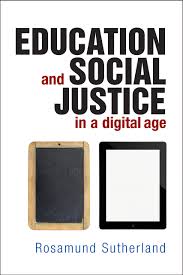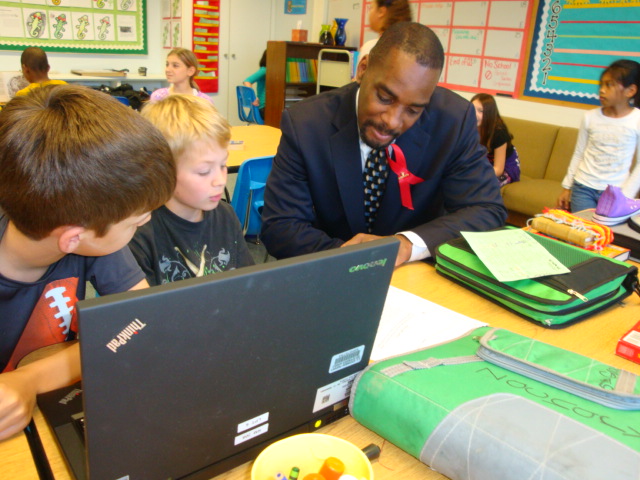In many countries the school curriculum oscillates between focusing on traditional subjects and focusing on skills that are linked to the needs of the 21st-century digital age. In this book Rosamund Sutherland argues against such a skills-based curriculum, maintaining that, from a social justice perspective, the priority of schools should be to give young people access to the knowledge that they are not likely to learn outside school. Claire Forbes finds Education and Social Justice in a Digital Age to be a refreshing and thought-provoking contribution to current debates.
Education and Social Justice in a Digital Age. Rosamund Sutherland. Policy Press. 2013.
 Against the backdrop of an education system in constant flux – between a wistful nostalgia for the rigour of the three Rs, Latin, and Classics on the one hand, and a bright eyed optimism for technocratic project-based learning on the other – the publication of Rosamund Sutherland’s Education and Social Justice in a Digital Age could not be more opportune. Sutherland’s initial inspiration for this book was to highlight the ‘persistent and pervasive’ injustices (p.1) within the English education system; namely what she sees as the divide between the private and state education sectors. In challenging current policy and practice, Sutherland argues that to achieve a ‘socially just’ system of education, curricula should focus upon formal knowledge, rather than be purely skill-based. As such, she questions both the role and value of high stakes testing and purports the need to integrate digital technologies more fully within the classroom to enhance learning and cognition. Her view is one of ‘shared responsibility for the education of all young people in order to build a stronger and more just society’ (xii), a notion which permeates her narrative as she puts forth her vision of an education system enabling equity for all.
Against the backdrop of an education system in constant flux – between a wistful nostalgia for the rigour of the three Rs, Latin, and Classics on the one hand, and a bright eyed optimism for technocratic project-based learning on the other – the publication of Rosamund Sutherland’s Education and Social Justice in a Digital Age could not be more opportune. Sutherland’s initial inspiration for this book was to highlight the ‘persistent and pervasive’ injustices (p.1) within the English education system; namely what she sees as the divide between the private and state education sectors. In challenging current policy and practice, Sutherland argues that to achieve a ‘socially just’ system of education, curricula should focus upon formal knowledge, rather than be purely skill-based. As such, she questions both the role and value of high stakes testing and purports the need to integrate digital technologies more fully within the classroom to enhance learning and cognition. Her view is one of ‘shared responsibility for the education of all young people in order to build a stronger and more just society’ (xii), a notion which permeates her narrative as she puts forth her vision of an education system enabling equity for all.
Sutherland begins by sharing the story of her own journey through the English education system. Opening with a vivid account recalling the intense shock she felt upon the discovery that her own great-great-grandmother had in fact been illiterate, Sutherland powerfully evokes the transformative value of education that is so often forgotten in today’s world, where education as a universal human right is taken for granted. This personal history continues, peppered with feeling and emotion, to depict the uneasiness Sutherland felt at being one of only two children from her primary school class to pass the 11+ and progress on to grammar school. By integrating her own educational biography into the narrative, one feels an emotional connection to the writer and a tangible sense that whilst this book is, in its widest sense, an academic critique of current educational policy, it is fuelled by the personal yet universal story of one person’s navigation through a complex and often brutal system. Indeed, Sutherland continues to weave personal anecdotes and family photos throughout each chapter, often for illustrative purposes, enabling the reader to achieve a closeness and an empathy that is often absent from academic writing.
Having contextualised her vision and aims within the opening chapter, Chapter 2 presents the case for embedding digital technologies more fully within the classroom to amplify possibilities for learning and achievement. The author explains that typically there is a conflict between the ICT requirements of school leadership and the specific use of this technology at the chalk-face, which has resulted in the widespread failure to integrate ICT effectively within teaching and learning. Sutherland illustrates this point by making reference to the recent proliferation of Virtual Learning Environments (VLEs) within schools. She describes how such systems have become widespread and yet, they are driven by the top-down requirement of institutional efficacy, which ultimately precludes the individual needs of teachers, their classes and any bottom-up innovation. Technology, it would seem, is often erroneously viewed as a magic solution to redress deficiencies, rather than as a tool to facilitate and extend learning. Indeed, Sutherland sees the potential of digital technologies as a ‘prosthesis of the mind’ (p.30), to transform, enhance and broaden a young person’s own capability set and facilitate their ability to achieve goals of their own choosing. Thus, for her, enabling young people to draw upon digital technologies to boost their capabilities and ultimately, to achieve functioning in the wider world is an essential component of education.

Another essential component of education is expounded in chapter 3, namely the issue of knowledge within the curriculum. Through her work on ‘the Transition Project’ (p.40), it was discovered that schools with a high proportion of pupils on free school meals tended to favour a skills-based curriculum, whilst schools with a middle class intake adopted a traditional, knowledge based curriculum. For Sutherland, this class divide within the curriculum on offer is a social injustice that runs the risk of limiting a young person’s capabilities and hence, their functionings beyond the school gate. She turns to Michael Young’s conception of current education as oscillating between ‘neo-conservative traditionalism’, entailing the preference for ‘traditional’ subjects, and ‘technical-instrumentalism’ (p.44), linking education to the needs of the economy. Instead, Sutherland suggests that we turn to Young’s alternative, that of ‘powerful knowledge’ (p.45), as a social realist approach to education, whereby subjects would be taught in a concept-driven manner, with a focus upon reflection and reason.
Having elucidated her stance and personal vision of education within the first three chapters, Sutherland proceeds to deepen her consideration of ‘powerful knowledge’ and its integration with digital technologies. To facilitate greater innovation in teaching and assessment and to really enable young people to expand their knowledge in a meaningful way, Sutherland argues for a reduction in high stakes testing at 16, to encompass English and Maths only. To take risks and to fail, she argues, are important stages in learning and as such, the author is convinced that innovative processes that comprise both these elements should be possible and indeed, desirable within school culture. Finally, Sutherland concludes her book, as she began, by returning to the personal. Yet, this time, she looks forward, rather than back, to consider the education that may lie in store for her as yet unborn great grandchildren. Still, she feels the keen injustice that access to good education is largely based on social class and living in the ‘right’ area. However, for her part, she remains committed to her belief in the ‘capabilities approach’ and the need for curriculum change, the embedding of digital technologies within the classroom and the possibility of innovation within our school system, with a view to reducing educational divides.
Education and Social Justice in a Digital Age is a refreshing and thought-provoking contribution to current educational debate: it is comprehensive, extremely engaging and persuasive throughout. Its claims regarding the need to return to knowledge based curricula are sure to divide opinion, provoke discussion and prompt the reader into a deeper reflection of concepts surrounding equity in education. Moreover, the range of critical perspectives, suffused with personal anecdotes and family photographs, inject a warmth and personality into the text, engendering an enjoyable and stimulating read for anyone interested in educational policy and inclusive education.
———————————————
Claire Forbes is a doctoral student in the Manchester Institute of Education at the University of Manchester. Her research centres around using Assets Based Community Development strategies to further understandings of schools as community agencies. Other research interests include ethnography, reflexivity and student voice. Claire tweet as @CldForbes. Read more reviews by Claire.







1 Comments